Introduction to Plastic Surgery SEO
In the digital era, the importance of a robust online presence cannot be overstated, especially for plastic surgeons. With potential patients increasingly turning to the internet to find and vet healthcare providers, having a strong search engine optimization (SEO) strategy is more crucial than ever. Plastic Surgery SEO refers to the tailored practices and methodologies aimed at improving the online visibility of plastic surgeons’ websites. By optimizing for relevant keywords, improving website architecture, and enhancing content quality, plastic surgeons can attract more qualified traffic to their sites. This specific form of SEO ensures that your practice stands out in a crowded marketplace, connecting you with individuals actively seeking cosmetic and reconstructive services.
The Importance of SEO for Plastic Surgeons
SEO for plastic surgeons is not just about ranking higher on search engine results pages (SERPs); it’s about connecting with potential patients at a critical moment in their decision-making process. In an industry where trust and credibility are paramount, appearing at the top of SERPs can significantly enhance your practice’s reputation and patient trust. Effective SEO strategies lead to increased visibility, higher website traffic, and ultimately, more consultations booked. It allows your practice to be found by those specifically searching for the cosmetic procedures you offer, making it an essential component of your digital marketing strategy.
Understanding Plastic Surgery Search Engine Optimization
To master Plastic Surgery SEO, it’s essential to understand the unique aspects that differentiate it from general SEO practices. This specialization involves a deep dive into keyword research, focusing on terms and phrases that potential patients are likely to use when searching for cosmetic surgery services. It also encompasses optimizing your website’s structure and content to ensure it’s not only user-friendly but also informative and reassuring, addressing common questions and concerns related to plastic surgery. Additionally, building a strong backlink profile and maintaining an active presence on relevant social media platforms can enhance your practice’s online authority and visibility. Understanding and implementing these strategies can set your practice apart in the highly competitive field of plastic surgery.
5 Proven Strategies to Boost Your Plastic Surgery SEO Rankings
Enhancing your plastic surgery practice’s SEO rankings is pivotal for increasing online visibility and attracting more potential patients. Implementing these five proven strategies can significantly elevate your website’s position on search engine results pages (SERPs), ensuring your practice stands out in the highly competitive cosmetic surgery landscape.
Comprehensive Keyword Integration for Plastic Surgeons
The cornerstone of any effective SEO strategy is comprehensive keyword integration. For plastic surgeons, this means meticulously researching and incorporating keywords that prospective patients are likely to use when searching for cosmetic surgery services. This process involves a blend of general and long-tail keywords, optimizing for both broad searches and specific, niche queries related to the plastic surgery field.
Targeting the Right Terms: SEO for Surgeons
- Understanding Patient Intent: Begin by understanding the various intents behind searches—whether informational, navigational, or transactional. This knowledge helps tailor your content and keywords to match what potential patients are looking for, enhancing relevance and engagement.
- Utilizing Long-Tail Keywords: Incorporate long-tail keywords—more specific phrases that are less competitive but highly targeted. For example, “rhinoplasty for deviated septum in Miami” targets a specific procedure and location, attracting more qualified traffic.
- Geographic Keywords for Local SEO: Emphasize geographic keywords to capture the local market. Many patients look for services within their vicinity, so including city or region names alongside service keywords can significantly improve your local search rankings.
- Procedure-Specific Keywords: Differentiate your practice by focusing on specific procedures you specialize in. Keywords like “minimally invasive facelift” or “laser skin resurfacing” can attract patients interested in those particular services.
- Analyzing and Adapting: SEO is not a set-it-and-forget-it strategy. Regularly analyze your keyword performance and adapt based on what’s working. Use tools like Google Analytics and Search Console to track how well your targeted keywords are performing and refine your strategy accordingly.
When optimizing your website for SEO, particularly in the competitive field of surgery, selecting the right keywords is crucial. Utilizing keyword tools to understand keyword difficulty and search volume is invaluable in this process. Here’s a brief explanation of how to use these metrics and why they are important:
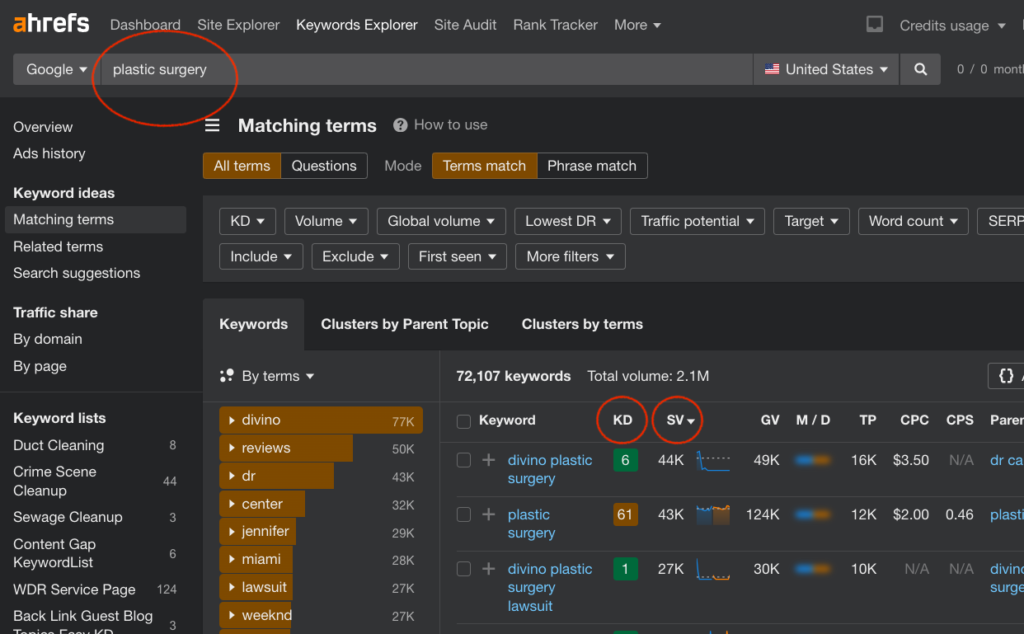
How to Use Keyword Difficulty and Search Volume Data:
- Search Volume: This metric indicates the average number of searches for a specific keyword over a set period, usually per month. High search volume suggests that a keyword is popular among users, but it might also indicate high competition.
- Keyword Difficulty: keyword tools provide a keyword difficulty score on a scale from 0 to 100, estimating how hard it would be to rank for a specific keyword based on the quality and the number of backlinks to the current top-ranking pages. A higher score means it’s more challenging to rank for the keyword.
Using Keyword Tool for SEO for Surgeons:
- Identify Keywords: Use keyword tools to find relevant keywords in the field of surgery with a reasonable search volume. This ensures you’re targeting terms that potential patients are actually searching for.
- Evaluate Difficulty: Look at the keyword difficulty score for each term. If you’re just starting your SEO efforts, you might want to target keywords with lower difficulty to build up your site’s authority.
- Balance Strategy: Aim for a mix of keywords, including both high-volume, competitive terms and lower-volume, niche terms. This balanced approach can help you attract both broad and specific audiences.
Why It’s Important:
- Focused Efforts: By understanding which terms are within your competitive reach, you can focus your SEO efforts more effectively, allocating resources to areas with the highest potential ROI.
- Content Relevance: Targeting the right keywords helps ensure that your content is highly relevant to what potential patients are looking for, improving user experience and engagement.
- Strategic Planning: Analyzing keyword difficulty and search volume aids in strategic planning, allowing you to prioritize your SEO tasks based on what’s achievable and what will have the most significant impact.
Example of Combining Keywords:
Take a look at the following example: a list of keywords such as “best surgeon for rhinoplasty” with a high search volume but also a high difficulty score, alongside “rhinoplasty recovery tips” with a lower volume (SV) and difficulty score (KD).
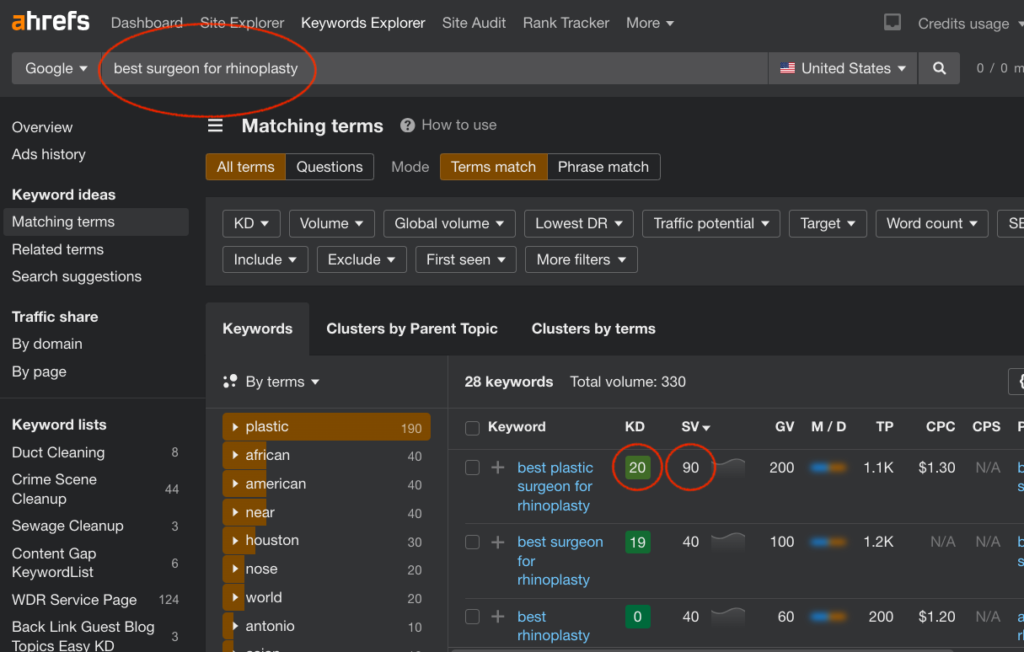
While the first term may bring more visibility, the second term represents a valuable opportunity to rank more quickly and attract targeted traffic, making it an essential part of a comprehensive SEO strategy for surgeons.
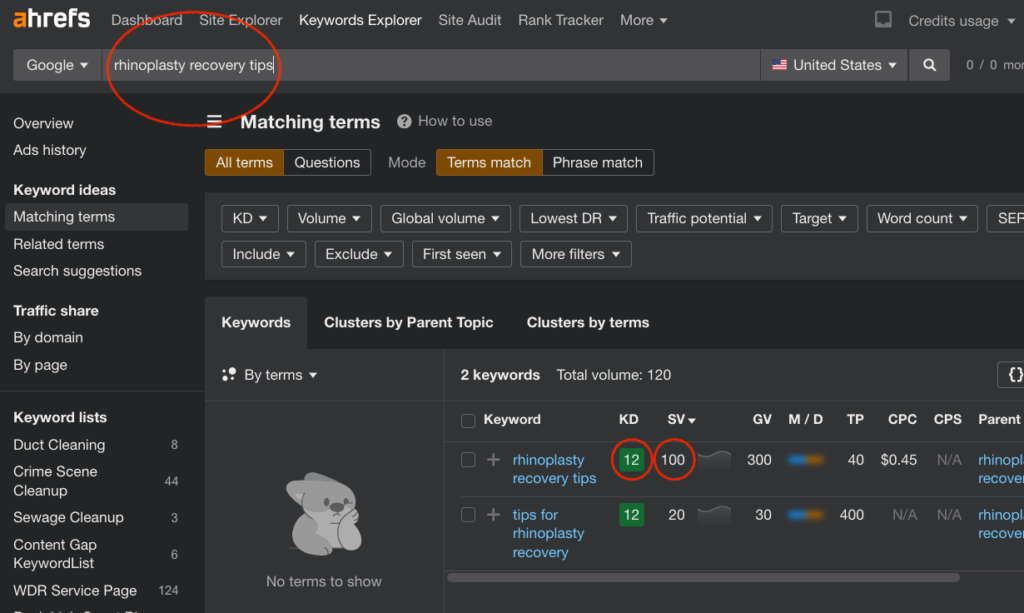
By leveraging keyword difficulty (KD) and search volume data (SV), surgeons can develop a targeted SEO strategy that enhances their online presence, attracts more patients, and ultimately grows their practice.
Crafting High-Quality Plastic Surgery Content
The digital forefront of your plastic surgery practice is defined by the content you produce. It not only serves to educate and inform potential patients but also plays a crucial role in your SEO strategy. Here’s how to ensure your content is up to the mark:
Defined Procedure Pages
Creating individual pages for each plastic surgery procedure you offer is essential. These pages should offer a deep dive into what each procedure entails, recovery times, what patients can expect in terms of results, and any potential risks involved. The goal is to provide a comprehensive resource that aids in the decision-making process for prospective patients.
Ensuring Unique and Engaging Content
To stand out, your content must resonate with your audience on a personal level. This means going beyond the basics of each procedure and sharing success stories, patient testimonials, and before-and-after galleries. Incorporating elements that address common concerns or misconceptions can also make your content more engaging and relatable.
Balancing Quantity with Quality of Content for Plastic Surgeon SEO Company Strategies
Maintain a steady flow of content to keep your audience engaged and support your site’s SEO rankings, crucial for any plastic surgeon SEO company. However, it’s vital that this does not come at the expense of quality. Each piece of content should offer value to your readers, whether it’s through providing new information, offering insights into plastic surgery trends, or helping them understand the nuances of different procedures. This approach ensures your SEO for cosmetic surgeons is both effective and engaging.
Content & Keyword Research for Precision in SEO for Cosmetic Surgeons
Use detailed keyword research to guide your content creation process, a staple strategy in SEO for cosmetic surgeons. Identifying the terms and phrases your potential patients are searching for can help you tailor your content to meet their needs. This not only improves your site’s visibility but also ensures that the traffic to your site is highly targeted, embodying a core principle of any proficient plastic surgeon SEO company.
Enhancing with Photography + Videography
Visual content can be incredibly powerful in the context of plastic surgery, where results are visually evident. High-quality photographs and videos showcasing before-and-after results, procedural explanations, and patient testimonials can significantly enhance the impact of your content. They provide a realistic expectation of results and can help to build trust with prospective patients.
Leveraging AI Content Creation for Plastic Surgeons SEO
Embrace AI tools for content creation to streamline the process and ensure a consistent output, an essential strategy for any plastic surgeon SEO expert. AI can assist in generating ideas, creating content drafts, and optimizing content for SEO, tailored to the unique needs of plastic surgeons’ SEO. However, it’s crucial to infuse this AI-generated content with a human touch, ensuring it reflects the empathy, expertise, and professionalism of your practice.
Benefits of using AI in Content Creation for Plastic Surgeons SEO:
- Efficiency and Productivity: AI content creation tools significantly speed up the content production process for plastic surgeons’ SEO. They can generate ideas, produce drafts, and suggest optimizations for SEO in a fraction of the time it would take a human content creator. This efficiency allows for more consistent content output, keeping your website fresh and engaging for potential patients.
- Scalability: With AI assistance, scaling your content production to meet the growing demands of a plastic surgeon’s SEO strategy becomes much easier. Whether it’s expanding the number of topics covered or simply increasing the volume of content, AI can adapt quickly to your needs, overcoming the resource constraints typically faced with human writers.
- SEO Enhancement: Many AI content tools are specifically designed with SEO in mind, an advantage every plastic surgeon SEO expert can leverage. They help identify trending keywords, suggest related topics, and ensure that content is structured in a way that search engines favor. This strategic alignment with SEO best practices can lead to improved visibility and higher rankings on search engine results pages, directly benefiting the SEO efforts of plastic surgeons.
Downsides of AI in Content Creation for Plastic Surgeons SEO:
- Lack of Personal Touch: While AI can generate informative content, it may lack the personal touch and deep understanding that comes from a human expert. Content that resonates on a personal level often requires human insight, empathy, and experiences, especially in sensitive areas like plastic surgery.
- Potential for Inaccuracies: AI tools are only as good as the data they’re trained on. They might inadvertently produce content that is outdated, inaccurate, or not fully aligned with the latest medical guidelines and practices. This requires a human review to ensure the content is trustworthy and accurate.
- Generic Content: There’s a risk of AI-generated content feeling generic or lacking in uniqueness. In a field where differentiating your practice is key to attracting patients, content that doesn’t stand out or reflect the unique aspects of your services might not be as effective in engaging potential patients.
- Ethical and SEO Considerations: Relying heavily on AI for content creation can raise ethical questions about authenticity and transparency. Furthermore, search engines are continually updating their algorithms to prioritize content that provides genuine value to users. Overreliance on AI could potentially lead to SEO penalties if the content is deemed low-quality or not user-focused.
Example of a Captivating Blog Post vs. a Boring Blog Post
When it comes to crafting blog posts, especially in a specialized field like plastic surgery, the difference between captivating and boring content can significantly impact reader engagement and interest. Here’s an illustrative comparison:
Captivating Blog Post Example: “Rhinoplasty: What to Expect Before and After”
This article stands out for several reasons, securing the first place in Google search results. Firstly, its title, “Rhinoplasty: What to Expect Before and After,” immediately grabs attention by offering prospective patients comprehensive insights into the entire process of undergoing a nose job. This title is not only engaging but also promises valuable information, setting clear expectations for the reader.
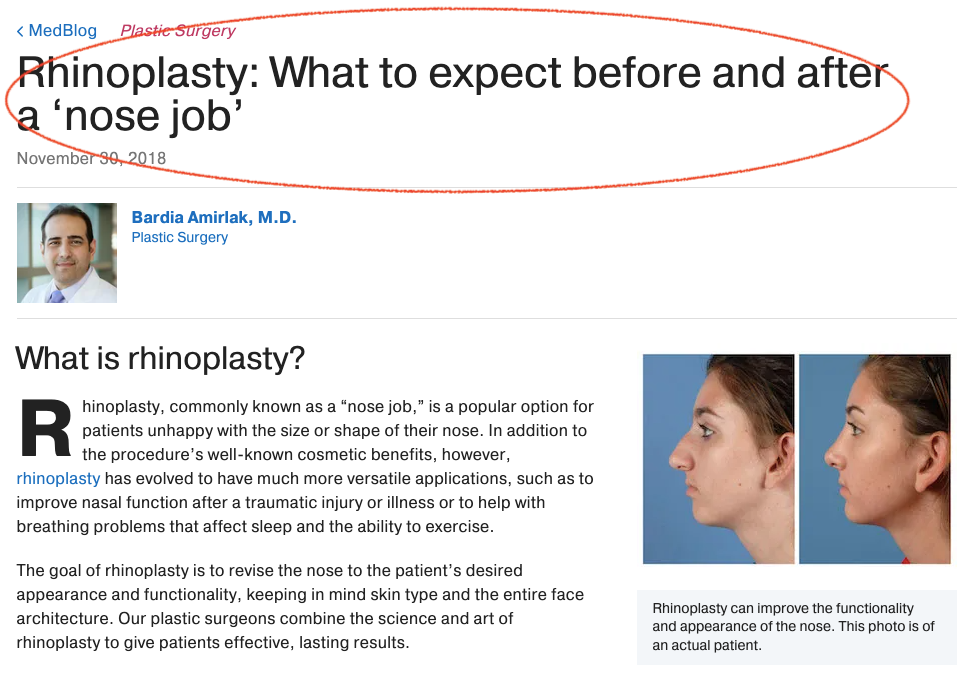
Moreover, the blog post excels in SEO optimization. Despite the title being slightly longer, it effectively incorporates relevant keywords and is paired with well-optimized meta tags. These elements are crucial for search engine visibility and have been meticulously crafted to ensure the page ranks highly.
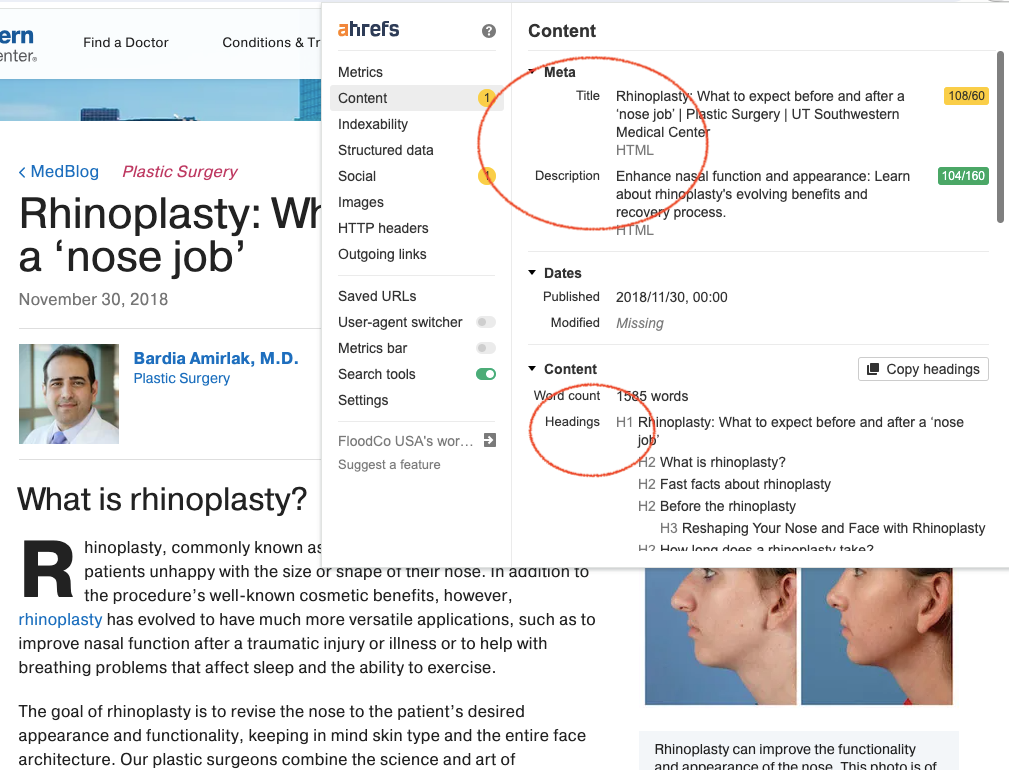
Additionally, the inclusion of visual aids such as pictures and videos greatly enhances the article’s appeal and user engagement. Visual content not only breaks up the text, making the article more readable, but also provides tangible examples of rhinoplasty results, which is highly valued by individuals considering the procedure.
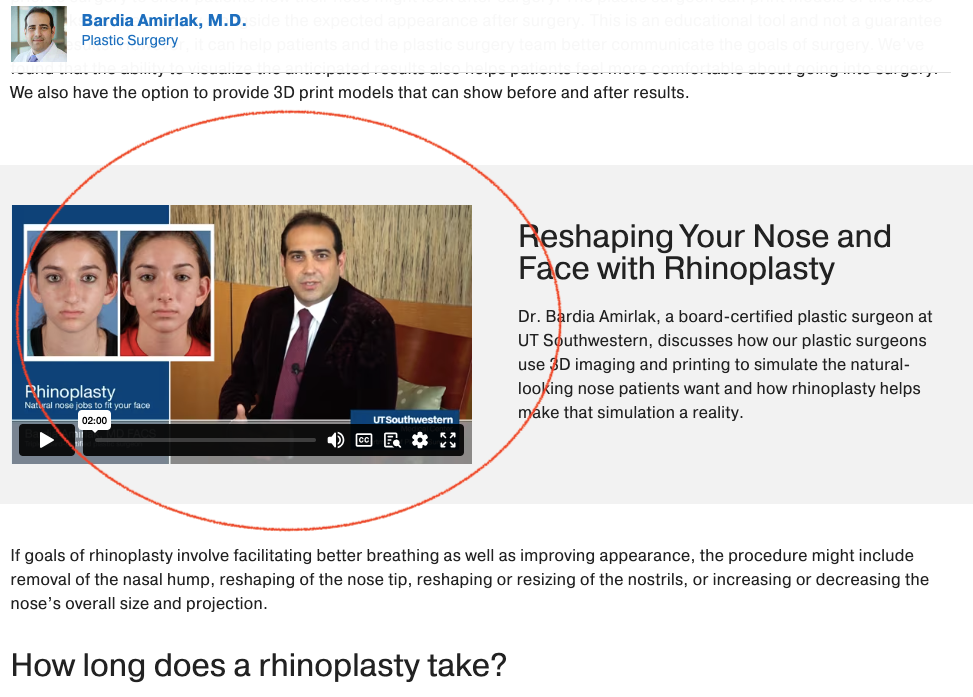
Boring Blog Post Example: “Rhinoplasty”
On the other hand, an article found in the 20th place on Google, simply titled “Rhinoplasty,” fails to capture the reader’s interest for several reasons.
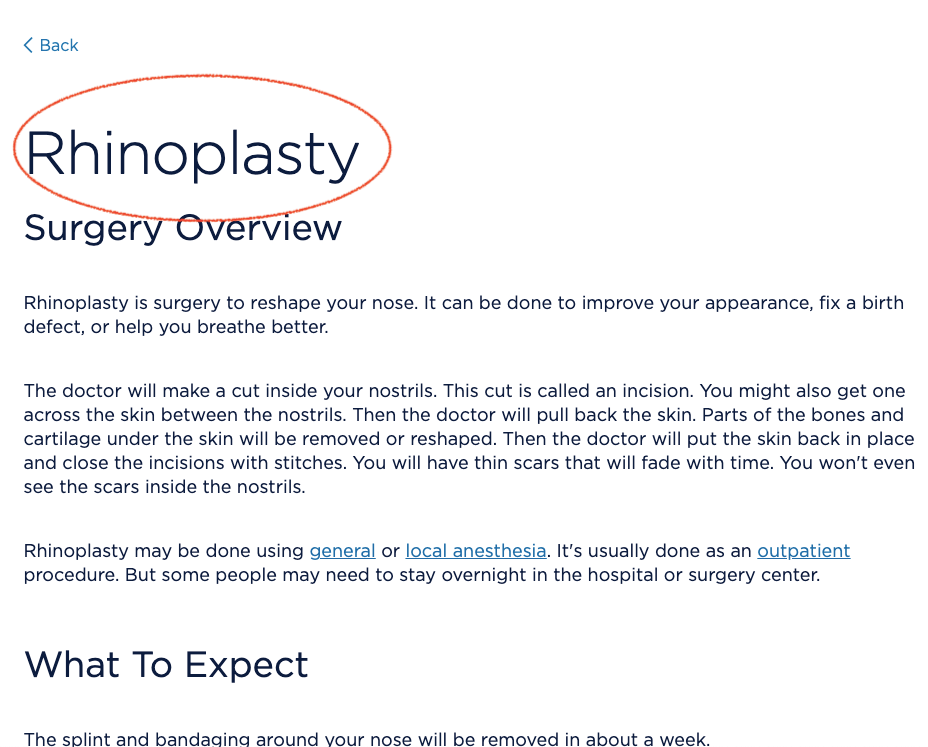
One significant shortcoming is the absence of a compelling H1 tag that could guide the reader through the content. An effective H1 tag serves as an anchor for the article, and its absence can leave readers feeling lost.
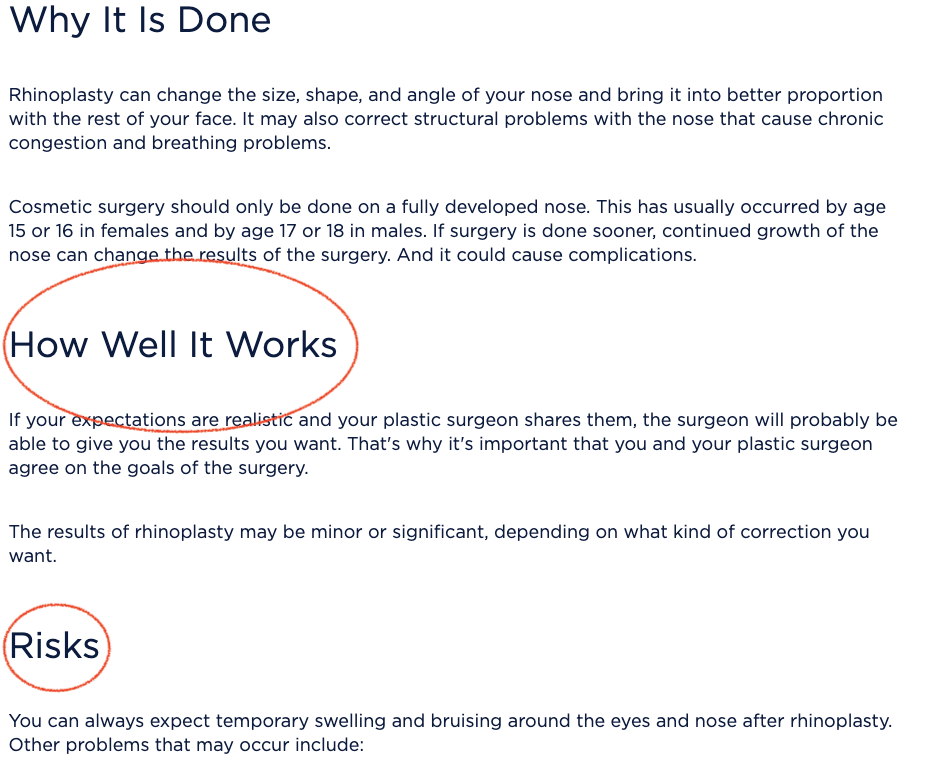
The description of the article is overly long and lacks conciseness, which may deter readers even before they engage with the content. In the digital age, where attention spans are short, getting to the point swiftly is key to retaining reader interest.
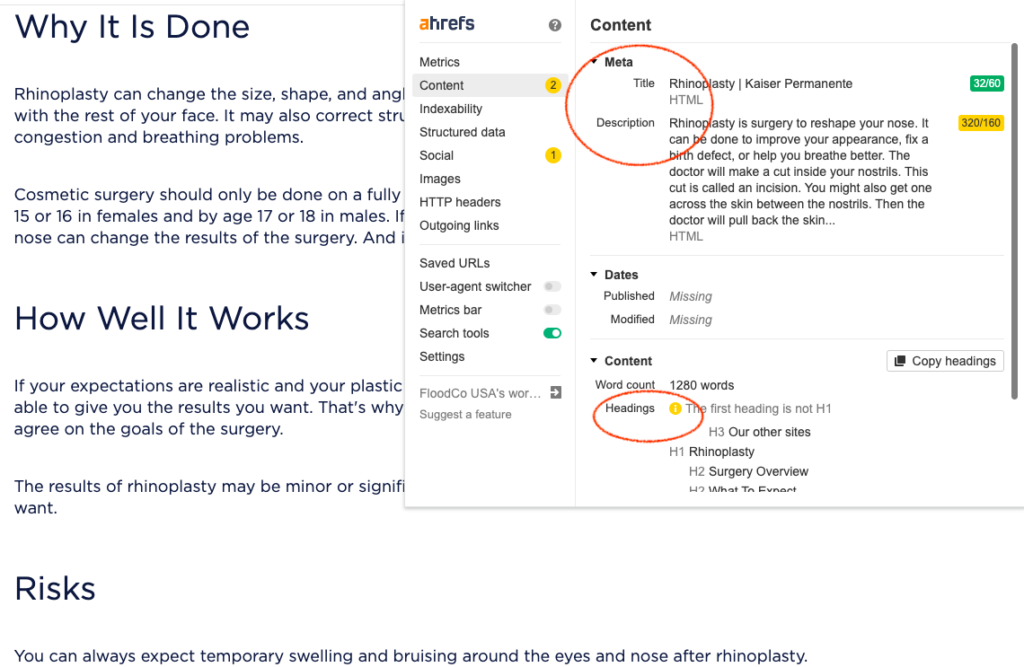
Furthermore, the lack of graphical elements such as pictures or videos is a missed opportunity for engagement. Visual content is not only engaging but also helps to explain complex procedures and outcomes in a way that text alone cannot.
Conclusion:
The comparison between these two articles highlights the importance of thoughtful SEO practices, including the use of engaging titles, optimized meta tags, clear headings, concise descriptions, and the incorporation of visual content. The first article’s approach to these elements explains its top ranking on Google, as it not only meets SEO criteria but also provides a rich, engaging experience for the reader. The second article’s shortcomings in these areas provide a clear lesson in the potential pitfalls to avoid when aiming to create captivating and informative content for a medical audience.
Optimizing Website Coding & On-Site SEO for Plastic Surgeons
In the highly competitive field of plastic surgery, having a website that ranks well on search engines is crucial. However, achieving this requires more than just high-quality content; the technical aspects of your website play a significant role as well. Here’s how you can optimize your website’s coding and on-site SEO to improve visibility and attract more potential patients.
Efficient Website Coding Practices
Efficient coding is the backbone of a high-performing website. For plastic surgeons looking to enhance their online presence, it’s important to focus on clean, streamlined code. This involves removing unnecessary characters, compressing images and files, and minimizing the use of heavy scripts that slow down page load times. Websites with faster loading times not only offer a better user experience but are also favored by search engines, leading to higher rankings.
Simplifying for SEO: Cutting the Fat
Simplification goes beyond just the code. It involves decluttering your website’s structure to ensure search engines can easily crawl and index your pages. This means organizing your content logically, using a clear navigation hierarchy, and implementing an XML sitemap. For plastic surgeons, making sure that each procedure has its own dedicated page with straightforward, easy-to-understand URLs is a step in the right direction. This not only helps search engines understand your site better but also improves the user experience for potential patients exploring your services.
Optimizing Title Tags + Metadata for Plastic Surgery SEO for Plastic Surgeon
Title tags and metadata play a critical role in on-site SEO, a key focus for SEO for plastic surgeon strategies and plastic surgery SEO experts. They are among the first elements that search engines examine to determine the relevance of your website to a user’s query. For plastic surgery websites, each page’s title tag should include key procedures and the geographic location to target local searches effectively, aligning with best practices recommended by plastic surgery SEO experts.
For example, “Rhinoplasty in [City Name] | [Clinic Name]” is a concise and effective title tag optimized for SEO for plastic surgeon strategies.
Metadata, specifically the meta description, provides a brief overview of what potential patients can expect to find on the page. It’s your chance to market your services directly in the search results, a tactic underscored by plastic surgery SEO experts. Including relevant keywords and a call to action in your meta descriptions can improve click-through rates. For instance, a meta description for a Botox page might read, “Discover the leading Botox treatments in [City Name] with [Clinic Name]. Schedule your consultation today and take the first step towards a refreshed appearance,” perfectly capturing the essence of SEO for plastic surgeon strategies.
Mastering SERP with High-Quality Content
High-quality content is pivotal in mastering Search Engine Results Pages (SERPs). For plastic surgeons, this means creating informative, engaging content that addresses potential patients’ questions and concerns. Each piece of content should be optimized for SEO without sacrificing readability or value to the reader. Incorporating keywords naturally, using headings for structure, and including internal links to related topics on your site can all contribute to better SERP positions. Content that educates about procedures, shares patient success stories, or provides care tips post-surgery can not only rank well but also establish your practice as a trustworthy authority in your field.
Implementing Schema for Enhanced Visibility for SEO Company Cosmetic Surgery
Schema markup is a powerful tool for SEO, championed by leading SEO company cosmetic surgery and plastic surgery SEO agencies. It utilizes a unique semantic vocabulary in the code to help search engines return more informative results for users. For plastic surgery websites, implementing schema can significantly enhance visibility in several key ways.
By integrating schema markup, an SEO company specializing in cosmetic surgery can help search engines understand the context of your content more effectively. This understanding makes it easier for them to display your website in relevant searches. This strategy is particularly beneficial for showcasing your practice’s services, such as specific plastic surgery procedures, patient reviews, or even your clinic’s location and contact information, areas where a plastic surgery SEO agency can provide expert guidance.
Enhanced features like rich snippets, a focus for any adept plastic surgery SEO agency, can make your listing more appealing and informative in search results, potentially increasing click-through rates. For example, using schema to highlight patient testimonials, before and after images, or FAQs about different procedures can provide prospective patients with valuable information right on the search results page. This strategic implementation, a hallmark of a skilled SEO company for cosmetic surgery, makes your site more likely to be visited and appreciated by potential patients.
Building Authoritative Backlinks for Surgeon SEO in Plastic Surgery
Building a robust backlink profile is a cornerstone of SEO success for plastic surgery practices, essential in both surgeon SEO and SEO plastic surgery strategies. Authoritative backlinks not only enhance your website’s credibility in the eyes of search engines but also drive targeted traffic. Here’s how to cultivate a healthy backlink ecosystem:
Balancing External and Internal Links
A balanced approach to both external and internal linking is key. While authoritative external links to your site from reputable sources boost your SEO, internal links help distribute page authority throughout your site and improve navigation for users. Make sure that internal links are relevant and use natural anchor text. This not only aids in SEO but enhances the user experience by providing them with more valuable information.
Strategic Backlink Acquisition
Strategic backlink acquisition involves identifying and reaching out to relevant, high-quality websites for linking opportunities. This could involve guest blogging on medical or beauty blogs, collaborating with industry influencers, or getting featured in local business directories. Always aim for relevance and quality over quantity; a few high-authority backlinks can be more beneficial than numerous low-quality ones.
Leveraging Directory Listings
For plastic surgery practices, directory listings can be a valuable source of authoritative backlinks. Ensure your practice is listed in reputable medical directories and local business listings. These directories not only provide a backlink but also put your practice in front of potential patients searching for plastic surgery services in their area.
Assessing Domain Authority for Backlink Quality
When pursuing backlinks, assess the domain authority (DA) of potential linking sites. High DA sites are viewed as more reputable and authoritative by search engines, making backlinks from these sites more valuable. Use SEO tools to evaluate the DA of websites and target those that can offer quality backlinks to your plastic surgery practice. Remember, a backlink from a highly authoritative site in your niche or local area is worth significantly more than several from low-authority, irrelevant sites.
Staying Updated with Google Algorithm Changes
In the ever-evolving landscape of SEO, keeping abreast of Google’s algorithm updates is crucial for maintaining and improving your plastic surgery practice’s online visibility. These updates can significantly affect your website’s ranking on the search engine results pages (SERPs), influencing how easily potential patients can find your services.
Frequency of Google Algorithm Updates
Google continuously tweaks its algorithm, with changes ranging from minor adjustments to major updates that can shake up the SERPs. While minor updates occur virtually daily, significant updates are less frequent but can have a profound impact on search rankings. It’s essential for plastic surgeons to stay informed about these updates, as understanding the nature and timing of algorithm changes can help you adjust your SEO strategy to maintain or improve your rankings.
Understanding the Impact of Google Algorithm on SEO
Each Google algorithm update aims to improve the user experience by delivering more relevant, high-quality search results. For plastic surgeons, this means ensuring your website and content are not just optimized for search engines, but are genuinely useful and accessible to your audience. Updates may penalize practices like keyword stuffing, low-quality content, and dubious backlink strategies, while rewarding sites that offer valuable information, a good user experience, and authoritative backlinks. Keeping up with these changes allows you to align your SEO efforts with Google’s standards, ensuring your site remains competitive in the search rankings.
Local Backlinks Strategy
To enhance your local SEO authority, focus on acquiring city and state-based backlinks. These local backlinks signal to Google that your practice is a relevant and authoritative resource within your geographic area, helping to improve your visibility in local search results. Strategies for building local backlinks include:
- Collaborating with local businesses: Engage in mutually beneficial partnerships where you can link to each other’s websites.
- Local media coverage: Getting featured in local newspapers, magazines, or news websites can provide valuable backlinks and increase local brand awareness.
- Community involvement: Participate in or sponsor local events, charities, or fundraisers, which can lead to mentions and backlinks from local organization websites.
- Local directories: Ensure your practice is listed in reputable local business directories, which can provide authoritative backlinks and make it easier for potential patients to find you.
Leveraging PR for Enhanced Cosmetic Surgery Search Engine Optimization
Public Relations (PR) can significantly amplify your plastic surgery practice’s online visibility and SEO efforts, particularly when focused on cosmetic surgery search engine optimization. By integrating PR strategies with cosmetic surgeon search engine optimization, you can create a comprehensive approach to digital marketing. This strategy not only enhances your practice’s reputation but also its online presence, making it a key component in successful cosmetic surgery search engine optimization.
Integrating PR Strategies with SEO for Comprehensive Visibility
Blending PR with SEO strategies provides a holistic approach to digital marketing, ensuring your practice’s visibility is maximized across all channels.
The Role of Press Releases in Plastic Surgery Marketing
Press releases play a crucial role in plastic surgery marketing by announcing important news, innovations, or achievements of your practice to a wider audience. When optimized for SEO, press releases can boost your website’s visibility, drive traffic, and enhance your brand’s authority.
Professional Press Release Services by Rose SEO
Our professional press release services are designed to create and distribute impactful news about your plastic surgery practice, ensuring it reaches your target audience and complements your SEO efforts.
Crafting Impactful Press Releases for Plastic Surgeons
We specialize in crafting compelling press releases that highlight the unique aspects of your practice, from innovative procedures to community involvement. Our team ensures that every press release is optimized for SEO, incorporating relevant keywords to enhance your online visibility.
Maximizing Reach and Engagement through Expert Distribution
Our distribution strategies are tailored to maximize the reach and engagement of your press releases. We leverage a network of healthcare and news outlets, ensuring your news is featured where it matters most, boosting your practice’s profile and SEO simultaneously.
Monitoring and Reporting on Press Release Performance
We provide comprehensive monitoring and reporting on the performance of each press release, giving you insights into their impact on website traffic, search engine rankings, and overall brand visibility. This data helps refine future PR and SEO strategies for even better results.
How Press Releases Complement Your SEO Efforts
Press releases can significantly complement your SEO efforts by generating backlinks from reputable news sites, enhancing your search engine visibility. The increased online coverage also supports keyword optimization and strengthens your practice’s credibility and authority in the plastic surgery field.
The Benefits of Combining SEO and PR for Plastic Surgeons
Combining SEO and PR strategies offers multiple benefits, helping to build a robust online presence that attracts and retains patients.
Building Brand Authority and Trust through Media Coverage
Media coverage from press releases can significantly boost your brand’s authority and trust. As potential patients see your practice featured in reputable publications, your reputation as a leading plastic surgery provider is solidified.
Enhancing Online Presence with Multi-Channel Strategies
A multi-channel strategy that includes both SEO and PR ensures that your practice’s visibility is maximized across the internet, from search engines to news sites. This broad presence helps capture a wider audience, drawing more potential patients to your practice.
The Role of Local SEO: NAP Consistency
In the competitive landscape of plastic surgery, local SEO plays a pivotal role in making your practice visible to potential patients in your geographic area. One of the foundational elements of local SEO is the consistency of your Name, Address, and Phone Number (NAP) across the internet. This consistency is not just a detail but a critical factor that can significantly influence your search engine rankings and, consequently, your practice’s online visibility.
Ensuring Accuracy of Name, Address, and Phone Number
Ensuring the accuracy of your practice’s Name, Address, and Phone Number information across all online platforms is crucial for several reasons:
- Search Engine Trust: Search engines like Google prioritize the user experience, aiming to provide the most accurate information possible. When your NAP information is consistent across various platforms, it signals to search engines that your business is legitimate and reliable, boosting your rankings in local search results.
- Improved Patient Experience: Accurate and consistent NAP information ensures that potential patients can easily find and contact your practice. Whether they’re looking at your website, a social media profile, or a directory listing, the information should be uniform, preventing any confusion that could lead to a loss of potential business.
- Enhanced Online Presence: Consistency in your NAP details contributes to a cohesive and professional online presence. It helps in building a strong brand image, making your practice more recognizable and memorable to potential patients.
- Preventing Duplication: Inaccurate or inconsistent NAP information can lead to the creation of duplicate listings on directories and other online platforms. These duplicates can split your reviews and ratings, dilute your search rankings, and confuse patients, harming your online reputation and SEO efforts.
Plastic Surgery SEO FAQs
Navigating the world of SEO for your plastic surgery practice can be complex. Here, we aim to demystify some of the most common questions and concerns regarding SEO strategies tailored for plastic surgeons.
Answering Your Most Common Questions
Q: Why is SEO important for my plastic surgery practice?
A: SEO is crucial because it enhances your visibility online, making it easier for potential patients to find you. By optimizing your website and content for search engines, you increase the likelihood of appearing at the top of search results for plastic surgery-related queries in your area, driving more traffic to your site and, ultimately, converting visitors into patients.
Q: How long does it take to see results from SEO?
A: SEO is a long-term strategy. While some changes can produce noticeable improvements in a few weeks, significant and sustainable results typically take anywhere from 3 to 6 months or longer. Consistency and adaptation to evolving SEO practices are key to seeing ongoing success.
Q: What are the key components of an effective plastic surgery SEO strategy?
A: An effective SEO strategy for a plastic surgery practice should include comprehensive keyword research to identify what potential patients are searching for, optimizing website structure and content for search engines, building authoritative backlinks, maintaining NAP consistency for local SEO, and regularly creating high-quality, relevant content that addresses the needs and questions of your target audience.
Q: Can social media impact my practice’s SEO?
A: Yes, social media can indirectly impact your SEO. While social media signals don’t directly influence search engine rankings, a strong social media presence can increase your brand’s visibility, drive traffic to your website, and enhance your online reputation, all of which can contribute to your overall SEO efforts.
Q: How important are online reviews for SEO?
A: Online reviews are critically important for local SEO. They not only influence potential patients’ decisions but also affect your visibility in search results. Google considers the quantity and quality of reviews when ranking businesses in local searches. Encouraging satisfied patients to leave positive reviews can help improve your search rankings and attract more patients.
Q: Should I hire an SEO professional or can I do it myself?
A: While basic SEO tasks can be handled in-house, especially with the right tools and a bit of learning, the complexities and constantly changing nature of SEO often necessitate professional assistance. An SEO professional or agency specializing in plastic surgery can offer the expertise and resources needed to develop and implement an effective, comprehensive SEO strategy, allowing you to focus on patient care.
How Plastic Surgery SEO Transforms Your Practice
The transformative power of Plastic Surgery SEO on your practice cannot be overstated. By implementing a well-structured SEO strategy, plastic surgery clinics can achieve unprecedented growth and reach. This approach not only improves your website’s ranking on search engines but also enhances user experience, making your site more accessible and informative to potential patients.
The end result? A notable increase in online visibility, which translates to more patient inquiries, consultations, and ultimately, procedures. It positions your practice as a leading authority in the plastic surgery field, helping to build trust with your audience. Furthermore, SEO’s cost-effectiveness compared to traditional advertising methods offers a higher return on investment, making it an indispensable tool for practice growth.
Case Studies: Success Stories from Plastic Surgery SEO Services
The impact of Plastic Surgery SEO is best illustrated through real-life success stories. Let’s delve into a couple of case studies that highlight the significant benefits of implementing effective SEO strategies:
- Metropolitan Cosmetic Center: After a comprehensive SEO overhaul, focusing on local SEO strategies and keyword optimization tailored to their specific services, Metropolitan Cosmetic Center saw a remarkable increase in their online visibility. Within six months, the clinic experienced a 70% increase in organic website traffic, leading to a 40% uptick in booked consultations. Their success was attributed to the meticulous optimization of service pages and the creation of engaging, informative content that addressed potential patients’ concerns and questions.
- Harborview Aesthetics: Harborview Aesthetics invested in a multifaceted SEO campaign that included optimizing their website’s technical structure, improving content quality, and establishing a strong backlink profile. The clinic also focused on enhancing their Google My Business listing and collecting patient reviews, which significantly improved their local search presence. As a result, Harborview Aesthetics doubled their web traffic in nine months and saw a 60% increase in phone inquiries directly attributed to organic search.
Ready to Transform Your Online Presence? Contact Rose SEO Today
Elevating your plastic surgery practice in the digital realm requires expertise, dedication, and a tailored SEO strategy that understands the unique challenges and opportunities of the cosmetic surgery industry. If you’re ready to enhance your online visibility, attract more patients, and grow your practice, Rose SEO is here to help.
Why Choose Rose SEO as Your Plastic Surgery SEO Company
Choosing Rose SEO for your plastic surgery SEO needs means selecting a partner dedicated to your success. Here’s why we stand out:
- Comprehensive Approach: Our SEO solutions go beyond basic keyword optimization. We offer a full suite of services, including website optimization, content creation, local SEO, backlink strategy, and social media integration, ensuring every aspect of your online presence is aligned for maximum impact.
- Proven Results: With a track record of enhancing online visibility and patient acquisition for plastic surgery practices, our strategies are backed by data, experience, and success stories from our satisfied clients.
- Transparent Communication: We believe in keeping our clients informed every step of the way. From detailed monthly reports to regular strategy sessions, you’ll always know how your SEO campaign is performing and what steps we’re taking to improve it.
Connect with Rose SEO for Expert Cosmetic Surgery SEO Services
At Rose SEO, we’re passionate about helping plastic surgeons thrive in the digital landscape. Whether you’re looking to enhance your local visibility, attract more patients to specific procedures, or establish your practice as a leading authority in cosmetic surgery, our team is ready to make it happen.



